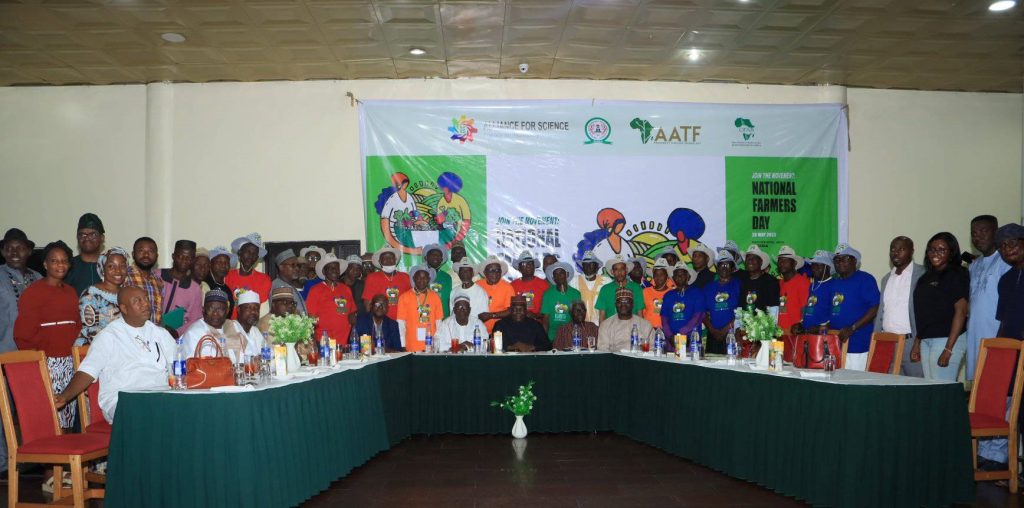
Stakeholders from across Nigeria’s six geopolitical zones seized the occasion of this year’s World Hunger Day celebration to advocate for the widespread adoption of agricultural biotechnology as a powerful tool to expedite Africa’s journey toward achieving food and nutrition security across the continent.
The event was graced by notable figures and organisations, including the director-general of the National Biotechnology Development Agency (NABDA), Prof. Abdullahi Mustapha, who shared insights and perspectives during a dinner organised for farmers.
Mustapha highlighted the significance of the event, explaining that the primary objective was to leverage the commemoration of World Hunger Day to inaugurate a ‘National Farmers Day’ campaign. This initiative aims to showcase the pivotal role that agricultural biotechnology can play in eradicating hunger within our lifetime, especially in regions of the global south.
World Hunger Day, observed annually, serves as an opportunity to raise awareness about the pressing issue of hunger and food insecurity that continues to impact millions of lives globally. The event, held in collaboration with the Alliance for Science Global South, sought to bring attention to the transformative potential of agricultural biotechnology in addressing these challenges.
Mustapha expressed gratitude to the attendees, particularly farmers, for their presence and support. He emphasised that while significant progress has been made in reducing hunger and malnutrition, the battle is far from over. Recognising the contributions of smallholder farmers, who cultivate the crops that sustain the population, is crucial to achieving lasting food security.
As the agency responsible for deploying biotechnology tools in Nigeria’s development, NABDA is actively engaged in combating hunger and malnutrition through the application of Genetic Modification technology. Mustapha commended the Alliance for Science (AfS) Global South Hub and the African Agricultural Technology Foundation (AATF) for their unwavering partnership and support in advancing this mission.
The director-general emphasised that the fight for food and nutrition security is a collective effort and collaboration is essential to achieving the desired results. He highlighted the importance of adhering to standards and practices set by international organisations, particularly the International Civil Aviation Organisation (ICAO), which provides guidance on investigation processes following aviation incidents.
The president of All Farmers Association of Nigeria (AFAN), Arc. Kabir Ibrahim echoed the sentiment of supporting biotechnology tools in agriculture. He asserted that genetically modified organisms (GMOs) are safe for consumption and use, dispelling misconceptions about potential risks. Ibrahim emphasised that agricultural biotechnology has the potential to uplift farmers from poverty, enhance their health and contribute to reduced production costs.
The West Africa Regional Representative for AATF, Dr. Jean Baptiste acknowledged the resilience and dedication of farmers in the face of challenges. He expressed admiration for their unwavering commitment to ensuring food security and nourishment for millions. Baptiste praised the adaptability of Nigerian farmers, who continue to embrace modern technology and innovative practices, such as biotechnology, to enhance productivity and minimise environmental impact.
He called for sustained support and investment in the agricultural sector, urging the government, organisations, and society to collaborate in providing essential resources and infrastructure for farmers’ prosperity. Baptiste emphasised the importance of fostering an enabling environment that encourages innovation and equitable agricultural practices.
The event, chaired by the AFAN president, celebrated the contributions of farmers to global food security. The dinner featured traditional performances and dishes prepared using improved crop varieties, including hybrid and genetically modified crops like cowpea.
The World Hunger Day celebration served as a platform to rally support for agricultural biotechnology as a transformative solution to addressing food and nutrition security challenges. Stakeholders, including NABDA, AFAN and AATF, showcased their commitment to uplifting farmers and ensuring a sustainable food supply for Nigeria and beyond.

